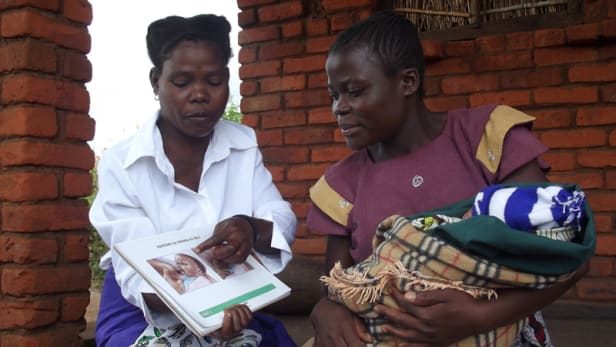By Anthony Lake
 |
| A care group volunteer conducts a home education visit to a lactating mother in Dowa district, central region of Malawi. Photo by: Wezzie Grace Kenan / Feed the Children / CC BY-NC-ND |
What if governments had a proven, cost-effective, underused way to save babies’ lives, reduce rates of malnutrition, support children’s health, increase educational attainment and grow productivity?
They do: It’s breast-feeding, and it’s one of the best investments nations can make in the lives and futures of their youngest members — and in the long-term strength of their societies.
In the earliest days of life, breast-feeding protects babies from diarrhea and pneumonia — diseases that are responsible for the deaths of approximately 823,000 children every year. And breast-feeding does more than prevent such tragic losses. It also provides children with a much healthier start to life — building a critical foundation for them to thrive, learn and grow.
In fact, the nourishment and stimulation of breast-feeding can help boost children’s early brain development during its most important phase. This translates into better school performance and, as adults, greater productivity and higher earnings. And breast-feeding reduces the risk later in a child’s life of noncommunicable diseases, such as diabetes, and obesity.
Breast-feeding is also good for mothers, helping reduce the risk of postpartum hemorrhage, increase the time between pregnancies, and decrease the risk of breast and ovarian cancer.
And breast-feeding is cost-effective. According to a World Bank report, every dollar invested in promoting breast-feeding in lower and middle-income countries can generate as much as $35 in returns.
Knowing all this, it is hard to believe that only 40 percent of the world’s infants are exclusively breast-fed during the critical first six months of life.
A new scorecard released during this week — World Breastfeeding Week — by the Global Breastfeeding Collective confirms the sad state of breast-feeding. When graded against recommended standards for optimal breast-feeding, not a single country makes the cut.
The price of this failure? An analysis released alongside the scorecard shows that in five of the world’s largest emerging economies, inadequate investment in breast-feeding results in an estimated 236,000 child deaths per year and $119 billion in economic losses.
The World Health Assembly has set a global goal of increasing the rate of exclusive breast-feeding in the first six months to at least 50 percent by 2025. The World Bank calculates that scaling up investments to reach that target has the potential to avert 520,000 deaths — and add $300 billion dollars to the global economy, by lowering health care costs and increasing productivity.
To meet even that modest goal we need to do more to help women overcome the barriers to breast-feeding. The private sector is an important part of the solution to change workplace policies and practices that make it difficult, if not impossible, for mothers to breast-feed their babies. Longer maternity leave — especially paid maternity leave — and better on-the-job opportunities for mothers to breast-feed will help.
So will enforcing international laws that prohibit aggressive, inappropriate and misleading marketing of breast milk substitutes. Such marketing methods do more than dissuade mothers from breast-feeding; they also potentially endanger infants, depriving them from the natural immunities provided by breast-feeding and exposing them to dirty water. And breast milk substitutes also subject families to expenses they can little afford. This ultimately works against companies’ bottom lines, as healthier families are better consumers.
We also need to do more at the community level to dispel misinformation and change social norms that discourage breast-feeding — sharing the evidence that breast-feeding is not only good for mothers and their babies, but also good for families, communities and societies.
Breast-feeding is not only the foundation for children’s development; it is a cornerstone of global development. In 2015, world leaders agreed to a set of global goals to end poverty, protect the planet and lay the foundation for prosperity and peace. The Sustainable Development Goals include global targets to end preventable deaths of young children, support early childhood development and improve child health. We can make much faster progress against all of these goals — and, by extension, broader goals of ending poverty and hunger — by investing in breast-feeding.
The evidence has never been stronger: Investing in breast-feeding is an imperative. If we don’t invest, we will pay a double price — in lost lives and lost opportunity.

No comments:
Post a Comment